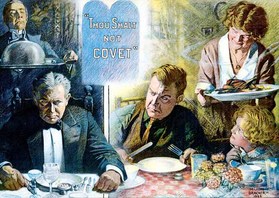
Covet / Desire in Hebrew
The verbal form for "covet" or "desire" in Hebrew is חָמַד (cha-mad). The word can be use in a positive or negative sense.
Positively, the word חָמַד means to take great delight in, or strongly desire. Negatively, the word carries the meaning of "covet" or "
inordinate, ungoverned, selfish desire." (BDB)
Noteworthy Usage In Old Testament
Some interesting usages of this word and its derivatives:
Mnemonics to Remember Covet in Hebrew
Find a "sound-alike" for the word חָמַד. For me an English "sound-alike" is "come-on." So I picture in my imagination a beautiful woman that is "coming on" to me; my reaction is to covet her. Find your own unique "sound-alike" for this word and then associate the English "sound-alike" to the Hebrew definition.
Biblical Hebrew Vocabulary Helps
To learn more Hebrew vocabulary and grammar quickly and easily, visit us on the web at Biblical Hebrew Made Easy! To see more works by author Blair Kasfeldt, visit his website, Boost Your Memory!
Buy Your Hebrew Vocabulary Guide Today and Master over 700 Hebrew Words Quickly and Easily!
The verbal form for "covet" or "desire" in Hebrew is חָמַד (cha-mad). The word can be use in a positive or negative sense.
Positively, the word חָמַד means to take great delight in, or strongly desire. Negatively, the word carries the meaning of "covet" or "
inordinate, ungoverned, selfish desire." (BDB)
Noteworthy Usage In Old Testament
Some interesting usages of this word and its derivatives:
- First Occurrence (positive): Genesis 2:9a, "And out of the ground the LORD God made every tree grow that is pleasant to the sight and good for food."
- First Occurrence of Coveting (negative), Genesis 3:6 "So when the woman saw that the tree was good for food, that it was pleasant to the eyes, and a tree desirable to make one wise, she took of its fruit and ate.
- Used in The 10 Commandments, "You shall not covet. " Exodus 20:17.
- Positively used, the Torah is desired more than gold. (Psalm 19:11)
- This word is used to describe the Messiah Jesus in Isaiah 53:2, "And when we see Him, There is no beauty that we should desire Him."
- Last Occurrence: Micah 2:2, "They covet fields and take them by violence, Also houses, and seize them. So they oppress a man and his house, A man and his inheritance."
Mnemonics to Remember Covet in Hebrew
Find a "sound-alike" for the word חָמַד. For me an English "sound-alike" is "come-on." So I picture in my imagination a beautiful woman that is "coming on" to me; my reaction is to covet her. Find your own unique "sound-alike" for this word and then associate the English "sound-alike" to the Hebrew definition.
Biblical Hebrew Vocabulary Helps
To learn more Hebrew vocabulary and grammar quickly and easily, visit us on the web at Biblical Hebrew Made Easy! To see more works by author Blair Kasfeldt, visit his website, Boost Your Memory!
Buy Your Hebrew Vocabulary Guide Today and Master over 700 Hebrew Words Quickly and Easily!



 RSS Feed
RSS Feed